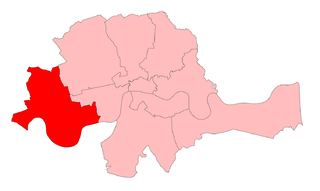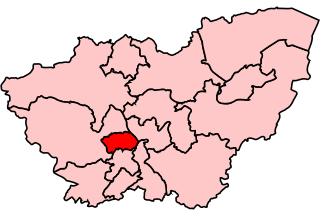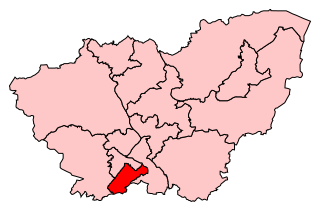
Sheffield Central is a constituency represented in the House of Commons of the UK Parliament since 2010 by Paul Blomfield, a member of the Labour Party.
Liverpool Scotland was a constituency represented in the House of Commons of the Parliament of the United Kingdom. It elected one Member of Parliament (MP) by the first past the post system of election.

Chelsea was a borough constituency, represented in the House of Commons of the Parliament of the United Kingdom.

Hackney North was a parliamentary constituency in "The Metropolis". It returned one Member of Parliament (MP) to the House of Commons of the Parliament of the United Kingdom.

Balham and Tooting was a constituency in South London, which returned one Member of Parliament (MP) to the House of Commons of the Parliament of the United Kingdom. It was created for the 1918 general election and abolished for the 1950 general election.
Whitechapel and St George's was a parliamentary constituency in east London, which returned one Member of Parliament (MP) to the House of Commons of the Parliament of the United Kingdom.
Bradford Central was a parliamentary constituency in the city of Bradford, West Yorkshire, which returned one Member of Parliament (MP) to the House of Commons of the Parliament of the United Kingdom. Elections were held under the first-past-the-post voting system.
Birmingham West was a parliamentary constituency represented in the House of Commons of the Parliament of the United Kingdom. It returned one Member of Parliament (MP), elected by the first-past-the-post voting system.
Wandsworth Central was a parliamentary constituency in the Wandsworth district of South London. It returned one Member of Parliament (MP) to the House of Commons of the Parliament of the United Kingdom, elected by the first-past-the-post voting system.

Mile End was a parliamentary constituency centred on the Mile End district of the East End of London. It returned one Member of Parliament (MP) to the House of Commons of the Parliament of the United Kingdom.
Leeds North was a borough constituency in the city of Leeds, West Yorkshire, which returned one Member of Parliament (MP) to the House of Commons of the Parliament of the United Kingdom, elected by the first past the post voting system.

Lambeth North was a borough constituency centred on the Lambeth district of South London. It returned one Member of Parliament (MP) to the House of Commons of the Parliament of the United Kingdom, elected by the first past the post system.
Wolverhampton West was a borough constituency in the town of Wolverhampton in the West Midlands of England. It returned one Member of Parliament (MP) to the House of Commons of the Parliament of the United Kingdom.

Bow and Bromley was a constituency in the Parliament of the United Kingdom. Located in the Metropolitan Borough of Poplar in London, it was created by the Redistribution of Seats Act for the 1885 general election and returned one Member of Parliament (MP) until it was abolished for the 1950 general election.
Hoxton was a borough constituency centred on the Hoxton district of London. It returned one Member of Parliament (MP) to the House of Commons of the Parliament of the United Kingdom, elected by the first past the post system.
Haggerston, formally known as the "Haggerston Division of Shoreditch", was a borough constituency centred on the Haggerston district of the Metropolitan Borough of Shoreditch in London. It returned one Member of Parliament (MP) to the House of Commons of the Parliament of the United Kingdom, elected by the first past the post system.











